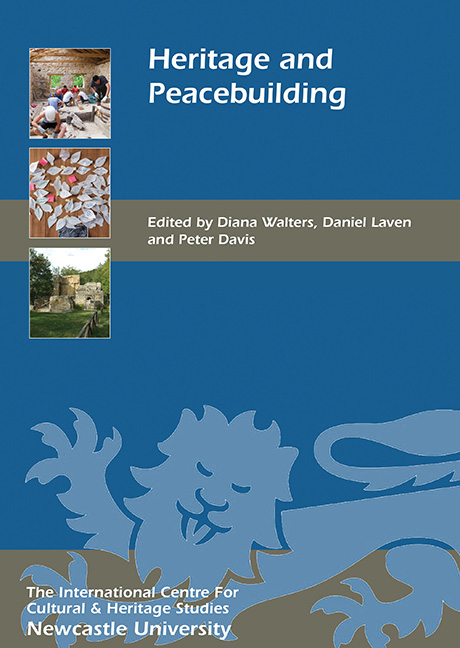Book contents
- Frontmatter
- Contents
- List of illustrations
- Acknowledgements
- List of abbreviations
- Preface
- Introduction
- NEW AND EMERGING IDEAS AROUND HERITAGE AND PEACE
- HERITAGE AND PEACEBUILDING IN PRACTICE
- HERITAGE, PEACEBUILDING AND SITES
- 14 A Conversation with Yongtanit Pimonsathean: Managing Conflict in Thailand
- 15 Challenging the Roots of Prejudice: the Monte Sole Case Study
- 16 Mau Mau: the Divisive Heritage of Liberation Struggle in Kenya
- 17 The Heritage of Geopolitical Borders as Peace Tourism Attractions
- 18 Rebuilding the Broken: Regional Restoration Camps as a Meeting Platform in the Western Balkans
- 19 Conflict or Reconciliation? Industrial Heritage Practices at a Turning Point
- 20 A Conversation with Saleem Ali: Environmental Challenges and Conflict Resolution
- List of Contributors
- Index
- Previous Titles
18 - Rebuilding the Broken: Regional Restoration Camps as a Meeting Platform in the Western Balkans
from HERITAGE, PEACEBUILDING AND SITES
Published online by Cambridge University Press: 16 February 2018
- Frontmatter
- Contents
- List of illustrations
- Acknowledgements
- List of abbreviations
- Preface
- Introduction
- NEW AND EMERGING IDEAS AROUND HERITAGE AND PEACE
- HERITAGE AND PEACEBUILDING IN PRACTICE
- HERITAGE, PEACEBUILDING AND SITES
- 14 A Conversation with Yongtanit Pimonsathean: Managing Conflict in Thailand
- 15 Challenging the Roots of Prejudice: the Monte Sole Case Study
- 16 Mau Mau: the Divisive Heritage of Liberation Struggle in Kenya
- 17 The Heritage of Geopolitical Borders as Peace Tourism Attractions
- 18 Rebuilding the Broken: Regional Restoration Camps as a Meeting Platform in the Western Balkans
- 19 Conflict or Reconciliation? Industrial Heritage Practices at a Turning Point
- 20 A Conversation with Saleem Ali: Environmental Challenges and Conflict Resolution
- List of Contributors
- Index
- Previous Titles
Summary
Heritage features – structures, objects, intangible heritage – are socially powerful because they have the ability to trigger the memories of the people who contributed their culture to a place, even if those people are no longer there. Because of its significance during times of conflict all forms of heritage become legitimate targets. During tragic events such as the Armenian genocide, Kristallnacht and the Bosnian War, an essential step to eliminating a people was to erase cultural memory by destroying libraries, archives, monuments and intangible heritage. Bevan (2007, 14) describes this process, stating that ‘It is as if the very bricks and stones are guilty of being the other as well as being a representative of the others’ presence.’ The implication is that during war original heritage features must be destroyed so that a new history can be invented, a new narrative produced, new books written and new cultural artefacts produced.
This chapter seeks to introduce a framework for peacebuilding by focusing on ways that working with cultural heritage can counter such processes of alienation and dehumanisation attached to heritage sites. We explore ways that these spaces can instead foster empathy and cross-cultural understanding that are enduring enough to withstand the pressures of identity politics and authorised discourses that promote division and fear. After discussing our working definition of peacebuilding, this chapter will outline our approach by exploring the case study of the Regional Restoration Camps (RRC), a two-week intensive training course in conservation practice that brings together students and young professionals from across the western Balkans and beyond. In order to counter the objectification of other people and their heritage, the RRC have utilised the concept of ‘safe space’, which will be explored in greater depth below. This chapter arose from the experience of the authors, who have been working at the non-governmental organisation Cultural Heritage without Borders (CHwB), which implements the RRC and works with cultural heritage in post-conflict areas.
- Type
- Chapter
- Information
- Heritage and Peacebuilding , pp. 205 - 220Publisher: Boydell & BrewerPrint publication year: 2017



